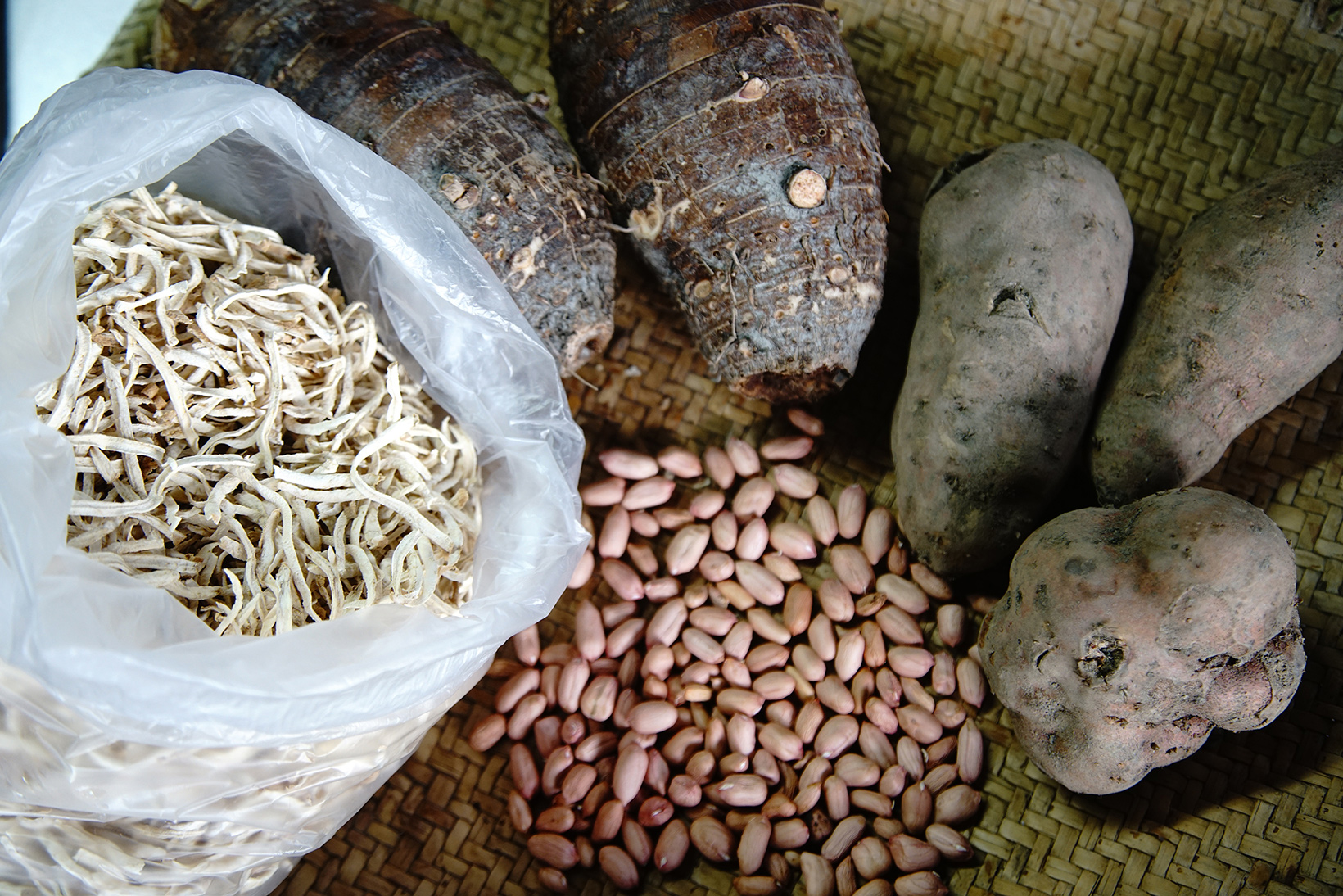This cooking classroom has no comfortable air conditioning, no precise measuring tools, and is located in the yard under a tin roof. Kakanan nua qemuma-quma offers home cooking classes in the community and invites you to come into the fields and hear the stories about the ingredients, the land and the people.
Vuvu A-mei (second right) brings cooking class students into the fields to learn where the ingredients come from. First left: Muni, first right: Su Chih-min.
At Kakanan nua qemuma-quma cooking class, vuvu A-mei takes the students into the fields. “When I got married 41 years ago, my parents gave me this piece of land as my dowry. We planted mangoes, bananas, red quinoa, millet...” A-mei pounds the taros harvested in the fields into a paste and mixes in pork; then she wraps the mixture in banana leaves, completing a snack for her grandson. “Although it's easier to buy it from stores, I want to pass on the traditions our ancestors left behind so that our children and their children will remember this taste.”
A Community Rural Scene
that is Gradually Fading
During the 1960s, the government encouraged Paiwan people living in Shandimen Township, Wutai Township, and Majia Township to move to the plains and develop the wild lands. The river flat next to Ailiao River in Pingtung County was assigned as lziuci Community by the government. Initially, community members grew crops such as millet, taros, and sweet potatoes; yet as the overall economic environment changed, they gradually switched to cash crops such as mangoes, pineapples, and bananas.
“When community members no longer plant traditional crops, our relationship with food changes” said Muni, the owner of Kakanan nua qemuma-quma. Muni (Paiwan) and her husband Su Chih-min (Bunun) started a series of courses titled “Paiwan Home Cooking Lab - Comfort Food on the Dining Table” at the indigenous community university in Pingtung County. They started the first class at their own community - lziuci Community, and visited Paiwan small farmers in the Pingtung region with their students. The objective is to rediscover the connections between the participants themselves, the land, and the culture.
The dish taught in the first class was kulus, a peanut and sweet potato sweet soup. The ingredients and instructions are very simple: put small sticks of sweet potatoes and crushed peanuts into a pot and cook for 15 minutes. This is a common household dish for the Paiwan and Rukai. When family members come back from the farming fields, they can enjoy a cool bowl of kulus to replenish their strength. “But modern Paiwan people are not necessarily farmers, so the habit of drinking kulus may disappear.” Muni does not think we need to resist change when it comes to the transition between new and old, but she hopes to preserve the memory of the food and dishes, and “replant” the traditional flavors back into her people.
Su Chih-min mentioned that vuvu sill insists on working in the fields even now, because she wants to pass on the flavors she enjoyed and her memories to the younger generation. Nevertheless, with so many dainty delicacies available now, the young people have lost interest in this kind of simple sweet soups. “I am a cook, and I need to figure out a way to let modern people fall in love with these traditional dishes again.”

Sweet potatoes shaved into small sticks, shelled peanuts, and taro. All of these ingredients used in class are harvested from vuvu A-mei's fields.
Learning Together
to Rediscover the Traditional Flavors
Unlike current trends that promote education on food and agriculture, the indigenous peoples focus more on preserving the species. Su explained it with an example: a lot of people are renovating traditional dishes now, but when the elders taste them, the first thing they say is, “this is not our flavor”. The difference in "flavor" comes from not only the ingredients and ways of cooking, but also the farming procedures.
“Most of the traditional crops grown by indigenous peoples are indigenous species in Taiwan; therefore the “flavor” is related to preservation of original species and how the farmer grows the crops. These aspects were often overlooked in the past when we were talking about indigenous cuisine.” Su believes that traditions are the foundation of innovation. How to help seasoned indigenous farmers transform their species preservation experiences into a culture and pass it on is the key to rediscovering the traditional flavors.
Breaking the monotonous image of modern cooking classes, students at this cooking class experience the simplest and most natural cooking procedures in the indigenous kitchen beside the fields.
Kakanan nua qemuma-quma organized the courses to let farmers, cooks, and consumers/participants interact with each other, and understand the relationship between traditional ingredients, land, and people. Muni remarked that this is also a joint learning experience for her. “I'm also learning. I'm learning more about my culture” she said with a smile.
The fragrant kulus moon cakes with sweet potato and peanut fillings are ready and out of the oven. When you take a bite, you can taste the sweet potato which slightly flavors the unsweetened filling in a pleasant and not overwhelming way, and the crushed peanuts bring in a crunchy texture. The simple deliciousness of kulus lets the memory of food take root in us again.
Kakanan nua qemuma-quma integrated traditional flavors with modern dishes and transformed the indigenous dish kulus into fillings for refreshing and sweet moon cakes.




